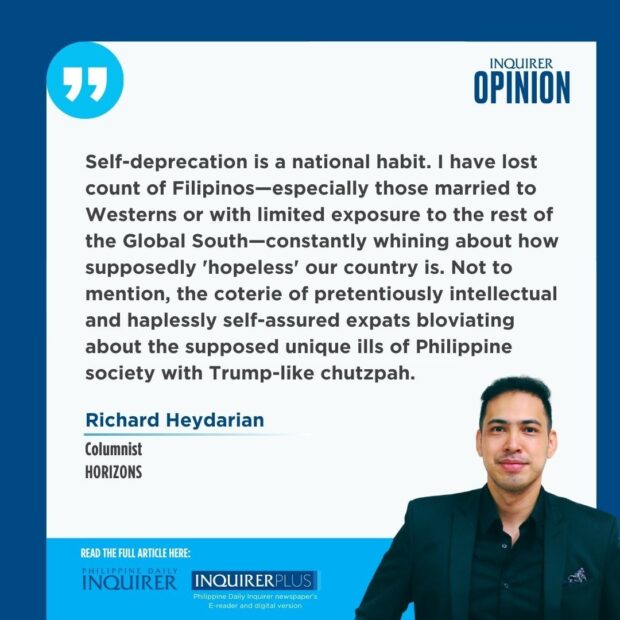Philippine negative exceptionalism

The great philosopher Isaiah Berlin famously distinguished two kinds of freedoms, namely (i) the “positive” variety that focuses on socioeconomic rights, participatory democracy, and overall empowerment of citizens; and (ii) the “negative” variety, which centers on protection of personal liberties against tyrannical rule and undue interference by the state institutions.
Each of these freedoms, however, presents their own dilemmas. The singular pursuit of positive freedom has been the hallmark of varieties of radical and, in most extreme cases, communist regimes, which culminated in catastrophic forms of dictatorships. Meanwhile, the singular focus of liberal democracies on “negative freedoms” has led to an increasingly untenable socioeconomic disparities and, on a more fundamental level, spawned an increasing atomistic, self-seeking, and lonely societies.
The explosion of right-wing, nativist, populist movements in flagship democracies from America to Britain and France is a testament to the limits of a political system established primarily in pursuit of “negative freedom” sans any significant investments in social justice and economic equity,
A similarly tortuous dialectic is at play when it comes to the notion of “national exceptionalism,” namely the fervent belief that each nation has its unique place in history and, in more grandiose cases, a mission to transform the world in its image. From America to China and Russia, all sorts of old and new empires have sought to dominate smaller nations based on the belief that they, and only they, are key to peace, prosperity, and, crucially, “civilization” in their respective spheres of influence.
While the Americans speak of a “rules-based order,” even as they arm and abet unruly allies engaged in mass atrocities the world over, the Chinese are seeking to establish neo-tributary systems across their supposed backyards even as they pretend to pursue “win-win” cooperation. As Kremlin, it has embraced an apocalyptic agenda of reasserting its dominance in post-Soviet Eurasia and the so-called pan-Slavic world with devastating consequences.
In the Philippines, however, our sense of “exceptionalism” moves in a completely opposite direction. Self-deprecation is a national habit. I have lost count of Filipinos—especially those married to Westerns or with limited exposure to the rest of the Global South—constantly whining about how supposedly “hopeless” our country is. Not to mention, the coterie of pretentiously intellectual and haplessly self-assured expats bloviating about the supposed unique ills of Philippine society with Trump-like chutzpah.
In most cases, I either ignore their kind or, when in the mood, end up giving them a crash course in post-colonial studies—namely, the horrible legacy of their colonization of the Philippines in tandem with most vicious local oligarchs and warlords. Even more pathetic is this growing tendency to seek affirmation from all sorts of entrepreneurial foreign vloggers, who deftly exploit our pitifully desperate need for affirmation from the “afam” (literally “a foreigner assigned to Manila” but has taken to mean “White man” in general today).
My greatest source of concern, however, is how our self-deprecating culture is fueling a particularly venomous form of strategic fatalism. Think of all the geniuses, including a former mayor-turned-president, who shamelessly implied that we should just succumb to China’s whims in the West Philippine Sea. It’s a toxic cocktail of “loser mindset” and potentially treasonous flirtations, which should have no place in any self-respecting nation.
The reality, however, is more complicated. Blessed with the 13th largest population on Earth, we are set to join the top 25 economies in the next decade. With greater national wealth, albeit yet to be equitably distributed, comes a more formidable armed forces and growing influence on the global stage. We are not a pushover nation.
We are, by all indications, a full-fledged “middle power” capable of charting our strategic destiny. But this would require dispensing with what film director Pepe Diokno has correctly identified as our stubborn “inferiority complex.” Reflecting on the final scenes of his iconic movie “Gomburza,” Pepe identified three major strands in Filipino responses to our collective tragic predicaments.
In the face of unfathomable injustice, the young Jacinto Zamora almost lost touch with reality and succumbed to profound despair. In contrast, the elder Mariano Gómes adopted a broadly serene and stoic approach, submitting himself to his destiny with full dignity. The most complex and consequential response, however, came from José Burgos, who remained, until the very end, unshakably defiant in the face of injustice—and thus, with his inexhaustible courage, helped spark a revolution that would change history forever.
rheydarian@inquirer.com.ph
















